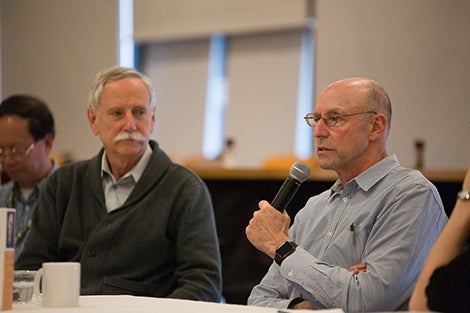May 16, 2016—How often do you think about where your food comes from or how it was produced? According to Michael Pollan, author and fellow at the Radcliffe Institute for Advanced Study at Harvard University, you should be asking those questions regularly. Pollan, who penned the 2006 bestseller The Omnivore’s Dilemma, joined Walter Willett, chair of the Department of Nutrition and Fredrick John Stare Professor of Epidemiology, for a Q&A at Harvard T.H. Chan School of Public Health on May 12, 2016. The two discussed a range of issues including food, nutrition, sustainability, and agriculture.
Eating in a way that’s sustainable and good for the environment can also be good for our health, said Pollan. A good starting point would be eating less meat and diversifying American farms. Pollan says that a major problem in the U.S. is that our industrial food system is largely a monoculture. “We grow huge amounts of corn and soy,” said Pollan. “When you consider that the food that comes off these monoculture farms is largely meat, corn sweeteners, soy oil to fry fast food—it’s the building blocks of an unhealthy diet.”
And there’s an environmental impact, too. Pollan says that growing large amounts of single crops makes them more susceptible to diseases or insects, which in turn increases the need to use more pesticides. And monoculture farming is a large contributor to climate change through greenhouse gas emissions. A key culprit is ammonium nitrate fertilizer that is often spread on fields. “Not only does that use a lot of greenhouse gas producing fossil fuel to create, but once you spread it on the field, and it gets wet, if it’s not taken up by the plant, it turns into nitrous oxide, and that is a very serious greenhouse gas,” he said.
A main driver of the current food system in the U.S., says Pollan, is an agricultural policy that is geared toward industrial farmers and the companies that purchase their products. In its place, he says, the U.S. needs a comprehensive national food policy—one that goes beyond nutritional guidelines and food assistance—that aligns the country’s environmental, agricultural, and health objectives.
Pollan admits that crafting a new agricultural policy in the U.S. will be difficult, so he added that people can also take smaller steps starting at home, such as cooking more and eating less fast food.
“The decline in home cooking, people eating together, was a huge contributor to ill health and this new agricultural landscape,” said Pollan. “It was our reliance on fast food companies to feed ourselves. There’s a whole [agricultural] system that flows from our outsourcing of eating to large companies. Only when you cook do you really have some say over what kind of food you buy.”
Photo: Sarah Sholes
